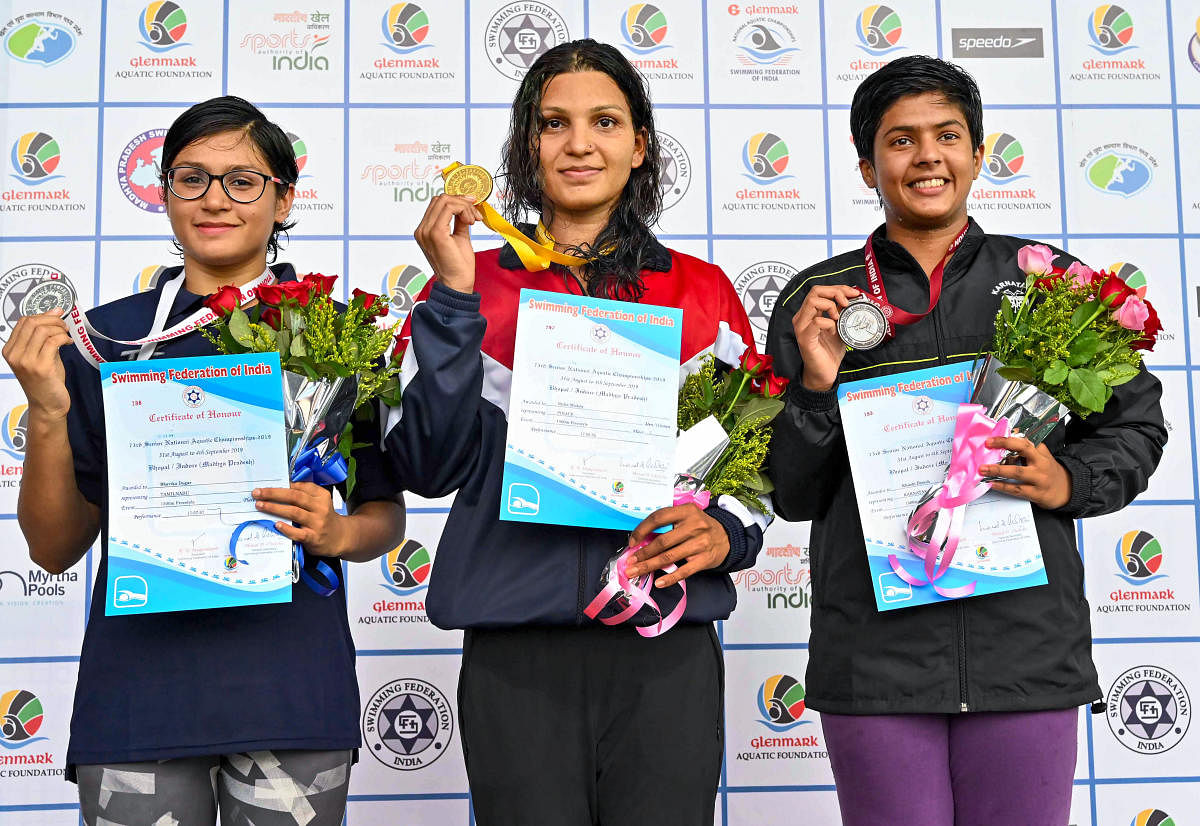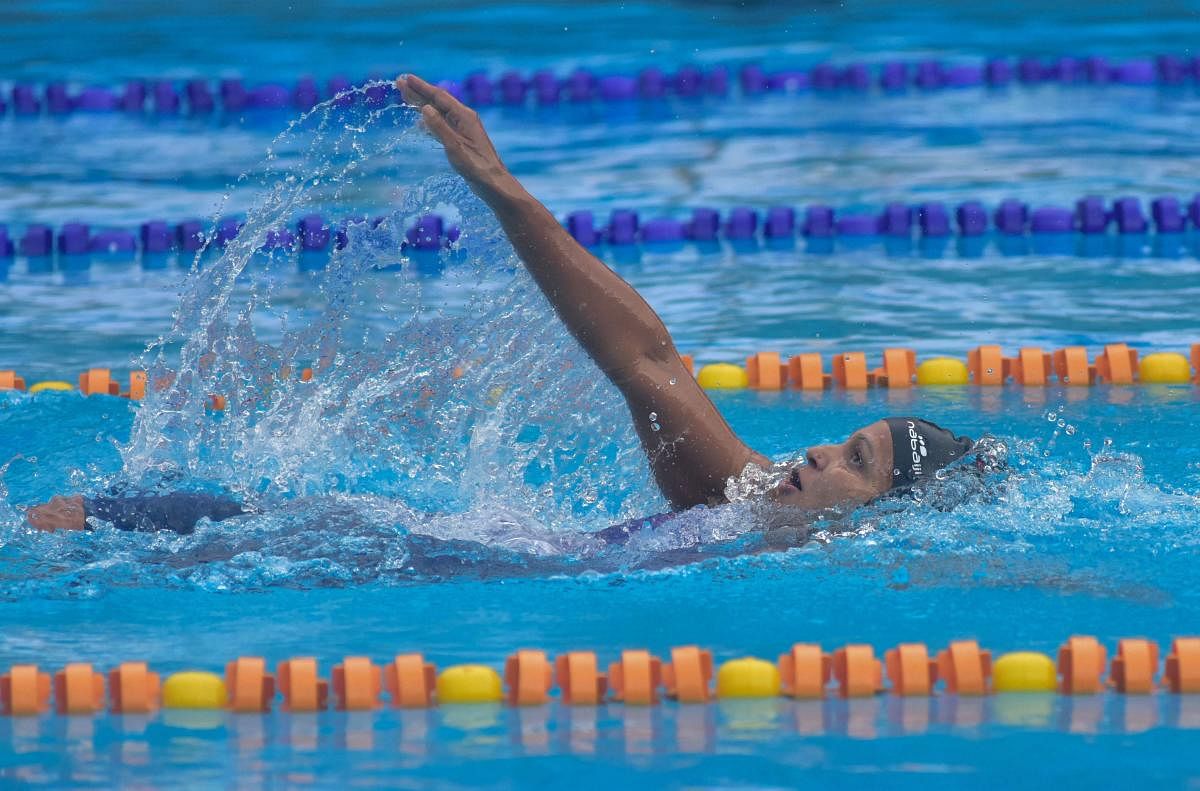
Richa Mishra touched the pad and looked around. The clock was stopped at 2:18.46. The timer continued to run where the second place should be, signalling faulty display.
The veteran swimmer took it in her stride, even as the rest of the field and the audience wondered aloud what the result was? That time, 2:18.46, would have broken the meet record, 2:23.62, for 200m individual medley by over five seconds. A record Richa holds.
Having set the national record in the 400m IM at last year’s Senior Nationals and becoming the first woman to go sub-five minutes with a time of 4:59.17, it wasn’t too far-fetched to believe she had done it again. At the age of 37!
But amidst the confusion, Richa swam and gave a warm embrace to her competitor, Kenisha Gupta. As the dust settled, it was clear Richa had won it again, but without the record. The official time was 2:24.70. Once again, the Police swimmer had vanquished all challengers.
The Delhi swimmer holds the national record both in 200m and 400m individual medley. She won five gold medals, two silver and one bronze during the World Police and Fire Games last month. She would finish the national meet in Bhopal with four golds.
“I love swimming. I don’t want to leave,” she says with a laugh. “I think I feel like if I stop this routine, I wouldn’t know what to do. I’m taking it a bit easy and enjoying it now. I’ve been racing for more than 25 years, so I’m enjoying it. The competition is a different feeling.”
Richa made her first Senior National meet back in 1998. Her aforementioned competitor Kenisha was born only five years later.
“Kenisha has improved a lot,” Richa would stress after her opening race, with the gold medal around her neck. “Last year my time was 2:24. I’m still on that. Her’s was 2:27 and she’s come down to 2:25.31 (and won silver). That’s really amazing.”
On the first day, she would admit that this was going to be her last meet where she does a full load of events. The thought, at the time, was to swim just one event or so next year, perhaps defend her medleys golds. But by the final day of the meet, the thought had changed.
“I’m not going to leave swimming,” she says. “In this championship, I didn’t do good timings but managed my events and golds. So I think I am going to swim one more year,” she admits.
Changing mind
“I keep changing my mind. The first day I thought of leaving but then now I think I should continue. Love for my sport keeps me going. I am doing pretty well right now so why to leave when my performance is all okay? Once if I feel that I’m not improving or that I can’t do it then I can think of quitting. At the moment I still feel I have so much courage and power in me that I can still go and break my own records.”
And only a brave man would bet against her doing it. If anything, Richa has shown that time, while irreversible, can be stretched, that it’s relative.
“Richa is very dedicated. She has that passion for swimming and she works very, very hard and with dedication even after all these years. That is commendable,” remarks Pradeep Kumar, the Indian national coach.
But it also brings up a finer issue, a predicament facing Indian swimming. The leakage of talent from the pool. Most of the young Indian swimmers switch focus to other avenues quite early in their careers, be it higher education, moving abroad, injuries or simply moving on. The high rate of dropouts means the talent pool hardly fulfills their potential, unlike Richa who has so successfully done it. “I believe in destiny and I think my destiny has let me swim for a long time and I feel really lucky,” she admits.
“She is racing against youngsters. Most of the other swimmers don’t continue beyond a certain age, they move on to something else,” Pradeep remarks.
Nihar Ameen, yet another Dronacharya Awardee and head at the Dolphin Academy, admits the same. Although neither can really pinpoint the cause. “At one time, Indian women were pretty strong - Shikha (Tandon) and Nisha (Millet) - we had lots of girls who were really strong. Richa is still plugging on, which is something unbelievable. 10 years ago what time she did, she did slower than that this year and still won by 20 meters. The standard of girls’ swimming has not changed much at all.”
Asian Games bronze medallist and now coach Sandeep Sejwal believes it’s the healthy kind of ego that drives the boys, who admittedly have a big leap to make themselves to be among the world elite. Although that gap is smaller.
“If you see the boys who are doing good, they are all between 16-19 and that’s the age where you would do anything for competition and your ego comes in the way. In a funny way that’s helping them. They are competing in different events, they have markers to compare like FINA points or making the top 8 in the world juniors. These are things they are pushing along and this competition between them is very healthy,” he says.
Richa has given stiff resistance, but father time is surely, if slowly, catching up. “I’m tired now...” Richa admits with a faint smile. After a quarter of a century of being one of the few constants in the women’s swimming scene, it’s not surprising. But, she is not tired enough.
